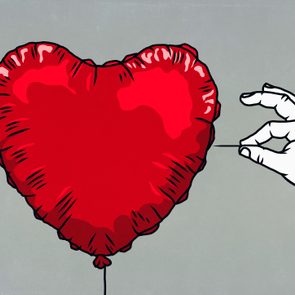6 Signs of Narcissistic Abuse Therapists Need You to Know
Updated: Jan. 26, 2021
Narcissism doesn't just affect one person—it can have far-reaching negative and sometimes dangerous effects. Here are the signs of narcissistic abuse in a relationship.
Our editors and experts handpick every product we feature. We may earn a commission from your purchases.
Understanding narcissistic abuse
While the word narcissistic is thrown around a fair amount, narcissistic personality disorder is a rare and diagnosable condition. According to The American Journal of Psychiatry, up to 5.3 percent of the general population has the mental health disorder. However, this doesn’t just affect those who have the personality disorder.
Therapists are beginning to recognize the negative and dangerous effects of narcissistic personality disorder on the people surrounding those with the disorder. They’ve even given it a name: narcissistic abuse.
Here’s what you need to know about narcissistic abuse, how to recognize the signs, and deal with it, according to our experts.
What exactly is narcissistic abuse?
“Narcissistic abuse is a term used in some therapy fields for the negative consequences of relationships with narcissistic individuals,” says W. Keith Campbell, PhD, psychology professor at University of Georgia and author of The New Science of Narcissism. Though it doesn’t have an official definition, experts who work with narcissists and those around them are honing in on why it occurs.
Why it occurs
“The basic reason for abuse is that people who are narcissists can be very good at many things but they’re not good at relationships,” says Elinor Greenberg, PhD, licensed psychologist, Gestalt therapist, trainer in borderline, narcissistic, and schizoid adaptations, and author of Borderline, Narcissistic and Schizoid Adaptations: The Pursuit of Love, Admiration and Safety. “They’re living on a tightrope while the rest of us are on solid ground. The narcissistic adaptation involves trying to get self-esteem and being as far from feeling shame as possible.”
Greenberg adds that these people can resort to extreme methods to avoid feeling shame, including devaluing those around them, acting grandiose, or being highly sensitive to things that others with thicker skin may have ignored.
The result: Instead of feeling shame or discomfort, narcissists go to great lengths to transfer those feelings to their partner, resulting in a cycle of emotional and sometimes physical abuse. (Here are the signs of a toxic relationship.)
There are a number of ways that narcissists will do this. Here, some of the tell-tale signs that there may be narcissistic abuse going on.

Signs of narcissistic abuse
Extreme language
“Narcissists tend to view the world as all good or all bad,” explains Greenberg. “The way this will manifest is that they’ll use lots of extreme language at both ends of the spectrum.”
For example, they might refer to a tasty omelet as the most delicious thing they’ve ever eaten or describe a headache as the worst pain that any human could bear. The bad news is that when narcissists turn this extreme language on their partner, it’s likely the negative end of the spectrum.
“Narcissists are very easily threatened and will be quick to invalidate others or make them feel worthless,” says Greenberg. According to the Office on Women’s Health, the feelings of shame and being unwanted that can result from this are hallmarks of emotional abuse in relationships. (Here’s what you need to know about gaslighting—a type of emotional abuse.)
There’s no middle ground
“To be diagnosed with full-on narcissistic personality disorder you have to lack the ability to see yourself and other people in an integrated, stable, and realistic way,” says Greenberg. One way this missing trait will reveal itself is in how the narcissist talks about themselves and their own flaws as well as about people who aren’t present.
“Most people live in a sort of middle ground in both cases,” explains Greenberg, noting that someone who isn’t a narcissist usually isn’t inclined to judge themselves or others too harshly. “But for narcissists, there isn’t any middle ground.” Proximity to this tendency towards extreme judgments can be dizzying and mentally draining. Keep these narcissist quotes handy when you’re struggling to deal.
One-mindedness
“One-mindedness is the belief that there is only one valid point of view and it’s their own. It’s something children have but usually grow out of around 3 or 4 years old,” says Greenberg. It can also be incredibly damaging to a relationship, which requires compromise.
“A narcissist only sees one way as the better way,” adds Greenberg. “They can’t see the pluses and minuses of someone else’s position.” In many cases, this leads to the narcissist being overly argumentative or antagonistic.
“This core antagonism has been called entitled self-importance or darkness,” says Campbell. “It’s in this antagonism where we find narcissists’ sense of entitlement, lack of empathy, manipulativeness, and belief in their superiority.” (A lack of empathy is one of many symptoms of someone with an antisocial personality disorder or a psychopath.)
Public negativity
Say you’re at a restaurant and the service is subpar. You may comment on it in hushed tones while your server is out of sight or even wait until you’re in the car on the way home to voice your disappointment. But a narcissist, says Greenberg, is much less likely to wait.
“They are quick to take others apart publicly in a negative and devaluing way,” she says. More generally, they may say things in public that their companions can’t believe they mean or find very odd, strange, or inappropriate. If this happens repeatedly, it may lead to less socializing and interacting with others and increased isolation, a tactic the National Domestic Violence Hotline highlights as a strategy used by domestic abusers. (Here are the signs of an abusive relationship.)
Prioritizing the self
“The narcissistic self is always at risk and can gain status or lose status at any time,” says Campbell.
“So narcissists’ motives and goals are heavily shifted in the direction of the self. With grandiose narcissism, people build and enhance themselves, and with vulnerable narcissism, people protect themselves. In either case, narcissists prioritize self before others.”
That’s a problem because mutual support is critical to any healthy, happy relationship and the lack of support can lead to feelings of isolation and low self-esteem. (This is what you should know about narcissistic abuse syndrome.)
Being a victim of life
Despite their feelings of superiority and entitlement, many narcissists also hold themselves completely unaccountable in the events of their own lives, says Greenberg.
“They will say things like it’s always the other person’s fault, they are perfectly blameless, and they just have a history of other people doing them wrong. But this ‘victim of life’ idea is just an unrealistic position.” It will also negatively affect the people closest to them since that is where the blame will most likely fall. (Does this sound like your mom? Here’s how to tell if you have a narcissistic mother.)
Dealing with narcissistic abuse
“Whether these things will truly become a problem in a relationship is a crapshoot. The dice can roll any way, any day,” says Greenberg. If the narcissist is getting validation from another source, such as from their job, they may be able to maintain a relatively healthy relationship for quite a while, she adds. “But if that validation goes away, things can go downhill fast.” Be aware of what a narcissist does at the end of a relationship so you can cope better.
If things do go downhill, seeking out a family or relationship therapist might help—though a narcissist is unlikely to admit any wrongdoing or recognize blame. If it gets to the point where you feel like you need help out of an emotionally abusive relationship, places like the National Domestic Abuse Hotline have resources at your disposal.























